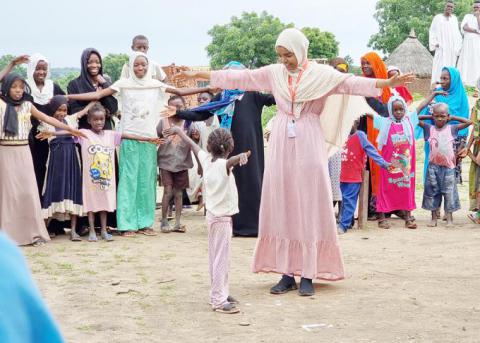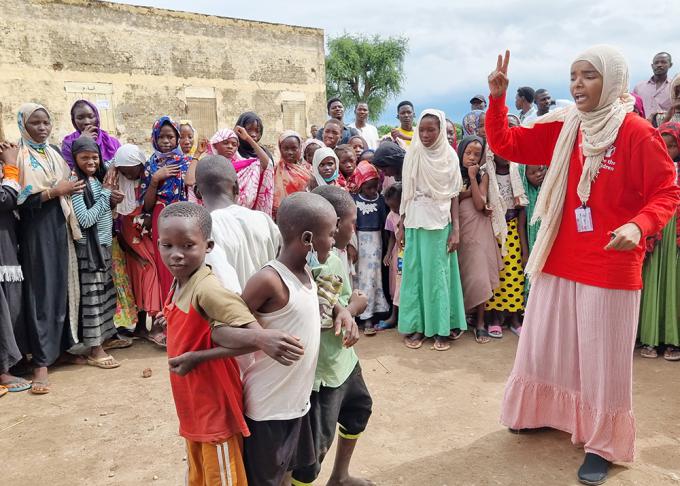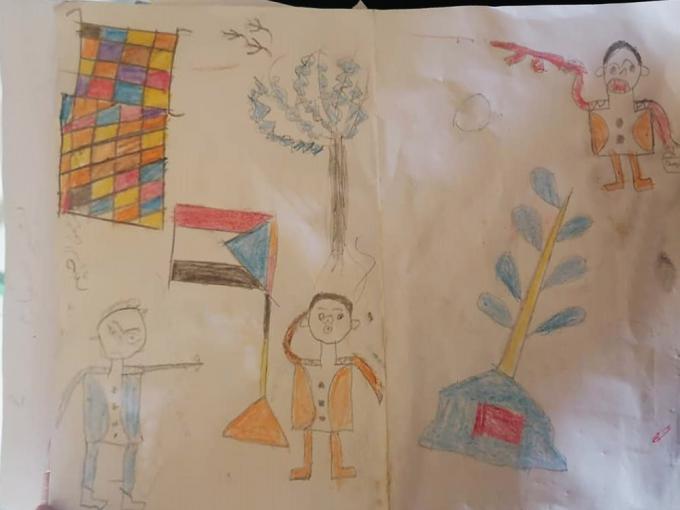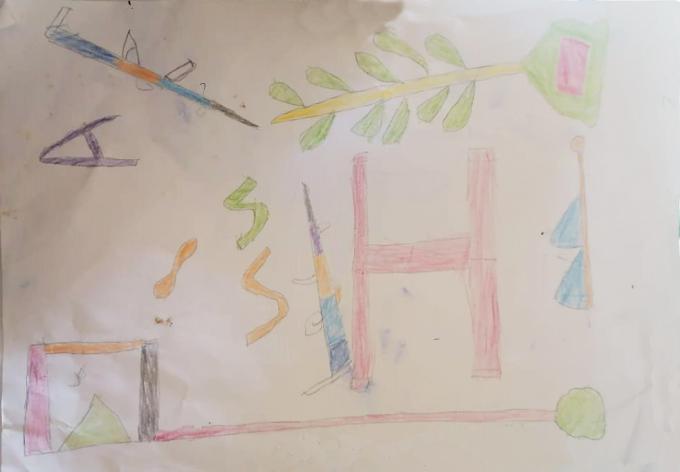Psychosocial support services for people affected by violence

خدمات الدعم النفسي للأشخاص المتضررين من العنف
لبابة نور الدائم: "انضممت مؤخرًا إلى منظمة رعاية الطفولة العالمية كمنسقة للصحة العقلية والدعم النفسي. تخصصت خلال دراستي في علاج الصدمات لأن السودان عانى من العديد من الكوارث والصراعات. أعتقد أن الدعم النفسي والعاطفي له نفس الأهمية مثل تغطية الاحتياجات المادية ".
بدأت لبابة عملها الاول مع منظمة رعاية الطفولة في ولاية النيل الأزرق ، حيث التقت بالعديد من الأطفال المتضررين من أعمال العنف الأخيرة.
تقول لبابه "يبدأ عملي عندما آتي إلى مكان جديد ، بإشراك الأطفال في الألعاب".
هذه هي الطريقة التي أقدم بها نفسي للأطفال وأبني الثقة معهم. يمكنني التعرف على الأطفال الأكثر تضرراً من الصدمة ؛ فهم غالبا يبتعدون عن الآخرين ، ولا يلعبون معهم ويبدون منعزلين فأحاول دمجهم في الألعاب ".
تقسم لبابه الأطفال بعد الجلسة الأولى إلى مجموعات من حوالي 20 طفلاً. والذي يساعد على خلق مساحة أكثر حميمية وإمكانية التعامل مع الأطفال بشكل مباشر. "في هذه المجموعات الصغيرة أريد أن أسمع من الأطفال أنفسهم. فهذا يساعدني على تحديد حالتهم العقلية والعاطفية. كما أنني أستخدم الرسومات والألعاب كأدوات لأن الأطفال يمكنهم التعبير عن أنفسهم بطريقة أخرى. ثم تحدد لبابة الأطفال الأكثر احتياجًا للدعم النفسي من خلال ملاحظاتها ، وما يعبّر عنه الأطفال عن أنفسهم ولغة أجسادهم أيضًا ".
كانت بعض الجلسات مع الأطفال صعبة للغاية بالنسبة إلى لبابه نفسها: "حيث رسم صبي ذات مرة رجالًا غاضبين جدًا بأسنان كبيرة وأيدي مخيفة وبنادق كبيرة. كان يرتجف الطفل عندما أوضح لي أنه شهد مقتل عمه المقرب أمامه. كان علي أن أكون متماسكه وأظل قويه لأكون قادره على دعمه. لحسن الحظ ، كان والدا هذا الصبي منفتحين للغاية على فكرة العلاج وبعد ثلاث جلسات بدأت حالته العاطفية في التحسن ".
تحلم لبابه بأن لا تؤثر النزاعات والأزمات على السودان.
ومع ذلك ، طالما أن هذا الحلم لم يصبح حقيقة ، فهي تتمنى أن تكون خدمات الدعم النفسي جزءًا من جميع الاستجابات والتدخلات الطارئة في جميع أنحاء البلاد.لقد أصبح عمل الدعم النفسي ممكنًا من خلال الدعم السخي من صندوق السودان الإنساني. ويتم تمويل المزيد من خدمات الدعم النفسي في السودان من قبل الإتحاد الأوروبي و USAID والصندوق الإنساني (منظمة رعاية الطفوله العالميه).

Psychosocial support services for people affected by violence
Lobaba Noureldaim: “I joined Save the Children recently as a Mental Health and Psychosocial Support Coordinator. During my studies, I specialized in trauma treatment because Sudan has experienced many disasters and conflicts. I believe that psychological and emotional support is of equal importance as covering the physical needs.” For Save the Children, Lobaba’s first deployment took her to Blue Nile state, where she met a lot of children affected by the recent violence. “When I come to a new place, I start my work by engaging the children in games.
This is how I introduce myself and build trust with them. I can recognise the children most affected by trauma; often, they keep away from others, do not play and seem withdrawn. I try to integrate them into the games.” After the initial session, Lobaba divides the children into groups of about 20 kids. This helps to create a more intimate space and the possibility to engage with the children directly. “In the smaller groups I want to hear from the children themselves. This helps me to identify their mental and emotional state. I also use drawings and games as tools because the children can express themselves in another way. Then I identify the children most in need of psychosocial support by taking into account my observations, what the children have expressed themselves and also their body language.”

Some of the sessions with children have been very challenging for Lobaba herself: “Once a boy drew very angry men with big teeth, scary hands and big guns. He was shaking when he explained to me that he witnessed his close uncle being killed in front of him. I had to hold myself together to remain strong and to be able to support him. Luckily, the parents of this boy were very open to the idea of therapy and after three sessions his emotional state started to improve.” Lobaba’s dream is that no more conflicts and crises will affect Sudan.

However, as long as this dream has not become a reality, she wishes that psychosocial support services will be a part of all emergency responses and interventions across the country. The psychosocial support work was made possible through the generous support of the SHF ERRM funding stream. Further psychosocial support services in Sudan are funded by ECHO, USAID and the Humanitarian Fund (Save the Children).
 Sudan
Sudan